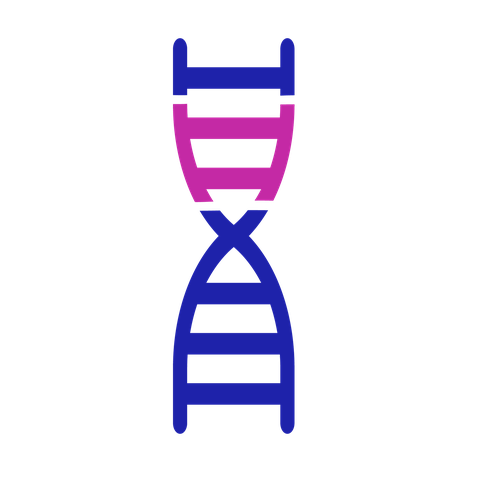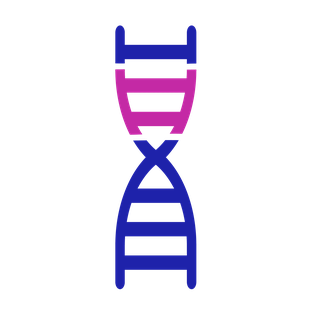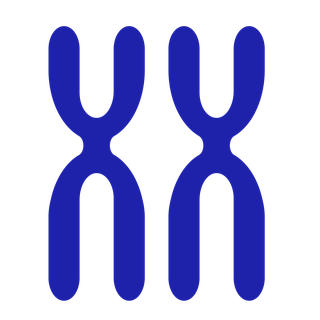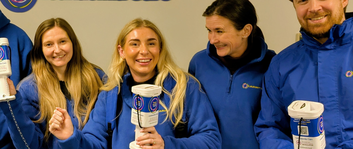Gene changes in acute myeloid leukaemia (AML)
People with AML have genetic changes in their leukaemia cells. These genetic changes stop the cells working as they should, leading to abnormal cell growth and cancer. Knowing exactly what genetic changes are in your leukaemia cells can help your haematology team work out the best treatments for you.

Genes and cancer
Certain genes tell our cells how and when to grow. If there are changes that stop these genes working properly, the cells can become abnormal and grow out of control. This leads to a cancer.
People with acute myeloid leukaemia (AML) have genetic changes in their leukaemia cells. These genetic changes stop the cells working as they should, leading to abnormal cell growth and cancer. Genetic changes can affect either individual genes or whole chromosomes. Changes can affect more than one gene.

A gene is a section of DNA that tells your cells how to make a protein.

Chromosomes are long, coiled strands of DNA that contain lots of different genes.
Why genetic changes happen
Most of the genetic changes in the cancer cells of people with AML occur by chance. These genetic changes happen during your lifetime. You do not inherit them from your parents, and you cannot pass them on to any children. They are not due to anything you have done.
Less commonly, some people with AML have genetic changes they inherited from their parents. These changes can be passed on to children. AML due to inherited genetic changes is called familial AML.
People with familial AML do not inherit AML directly. They inherit a changed gene that can increase their chance of getting it in the future. It does not mean they will definitely get AML. It means they may develop AML later in life.
Importance of genetic changes
Different genetic changes can make your leukaemia cells behave differently.
Knowing the genetic changes you have can help your haematology team work out the best treatments for you. It can also help them predict how well your AML is likely to respond to treatment.
To find out what genetic changes you have in your leukaemia cells, your haematologist should send your blood or bone marrow samples for testing. The results can be complicated and use a lot of technical terms. Your haematology team will talk to you about what your results mean.
If you have an inherited genetic change
If your initial test results show that you might have an inherited gene change, your haematologist may recommend more tests to confirm this. This usually involves taking a small sample of your skin.
- If the extra tests show your genetic change is inherited, other close members of your family might also have it. This means they may have a higher chance of getting AML than people without the genetic change. It does not mean they will definitely get AML.
- You should be offered genetic counselling to learn more about what this means for you and your family.
- You may be advised to tell close family members such as parents, adult children, brothers and sisters. They should also be offered genetic counselling to help them decide if they want to be tested for the genetic change.
Sources we used to develop this information
Askın-Celik T, Dey S, editors. Chromosomal abnormalities. IntechOpen; 2020. Available from: http://dx.doi.org/10.5772/intechopen.77904
Döhner H, Wei AH, Appelbaum FR, Craddock C, DiNardo CD, Dombret H, et al. Diagnosis and management of AML in adults: 2022 recommendations from an international expert panel on behalf of the ELN. Blood 2022;140(12):1345-1377.
Institute for Quality and Efficiency in Health Care. What does genetic testing involve? InformedHealth.org 2019. Available at: https://www.ncbi.nlm.nih.gov/books/NBK367582/.
Issa GC, DiNardo CD. Acute myeloid leukemia with IDH1 and IDH2 mutations: 2021 treatment algorithm. Blood Cancer J 2021;11(6):107.
Homan CC, Scott HS, Brown AL. Hereditary platelet disorders associated with germ line variants in RUNX1, ETV6, and ANKRD26. Blood 2023;141(13):1533-1543.
Kim K, Ong F, Sasaki K. Current Understanding of DDX41 Mutations in Myeloid Neoplasms. Cancers (Basel) 2023;15(2):344.
Kotmayer L, Romero-Moya D, Marin-Bejar O, Kozyra E, Catala A, Bigas A, et al. GATA2 deficiency and MDS/AML: Experimental strategies for disease modelling and future therapeutic prospects. Br J Haematol 2022;199(4):482-495.
Lagunas-Rangel FA, Chávez-Valencia V, Gómez-Guijosa MÁ, Cortes-Penagos C. Acute myeloid leukemia—genetic alterations and their clinical prognosis. International journal of hematology-oncology and stem cell research. 2017 Oct 10;11(4):328.
Lv L, Yu J, Qi Z. Acute myeloid leukemia with inv(16)(p13.1q22) and deletion of the 5’MYH11/3’CBFB gene fusion: a report of two cases and literature review. Mol Cytogenet 2020;13:4.
Mehta P, Telford N, Wragg C, Dillon R, Freeman S, Finnegan D, et al. Recommendations for laboratory testing of UK patients with acute myeloid leukaemia. Br J Haematol 2023;200(2):150-159.
Nickels EM, Soodalter J, Churpek JE, Godley LA. Recognising familial myeloid leukemia in adults. Ther Adv Hematol 2013;4(4):254-269.
Speight B, Hanson H, Turnbull C, Hardy S, Drummond J, Khorashad J, et al. Germline predisposition to haematological malignancies: Best practice consensus guidelines from the UK Cancer Genetics Group (UKCGG), CanGene‐CanVar and the NHS England Haematological Oncology Working Group. Br J Haematol 2023;201(1):25-34.
Yang L, Rau R, Goodell MA. DNMT3A in haematological malignancies. Nat Rev Cancer 2015;15(3):152-165.
Yang F, Long N, Anekpuritanang T, Bottomly D, Savage JC, Lee T, et al. Identification and prioritization of myeloid malignancy germline variants in a large cohort of adult patients with AML. Blood 2022;139(8):1208-1221.
Yu J, Li Y, Zhang D, Wan D, Jiang Z. Clinical implications of recurrent gene mutations in acute myeloid leukemia. Exp Hematol Oncol 2020;9:4.
Financial support was provided as an Independent Medical Education Grant from Pfizer Limited. In accordance with our policies, Pfizer had no editorial input into the content.
Need support?
You are not alone. We're here for you whether you have a diagnosis yourself or know someone who has. If you'd like advice, support, or a listening ear, call our freephone helpline on 08088 010 444 or send a WhatsApp message to 07500 068 065.
Help us improve our information
We aim to provide information that’s reliable, up-to-date, and covers what matters to you. Please complete our short survey to help us improve our information and make sure it meets your needs.
About our information
This information is aimed at people in the UK. We do our best to make sure it is accurate and up to date but it should not replace advice from your health professional. Find out more about our information.
Page last reviewed: 31 January 2024
Updated January 2026
Next review due: 31 January 2027
More information
About acute myeloid leukaemia (AML)
Acute myeloid leukaemia (AML) is a fast-growing blood cancer. It develops when myeloid stem cells …
Treatment for acute myeloid leukaemia (AML)
Acute myeloid leukaemia (AML) is a fast-growing blood cancer. Find out about intensive and non-intensive …
Relapsed or refractory acute myeloid leukaemia (AML)
Relapsed acute myeloid leukaemia (AML) is when AML comes back after successful treatment. Refractory AML …
Need help understanding this information?
Our support team is here to answer your questions and provide guidance.
Contact Support


